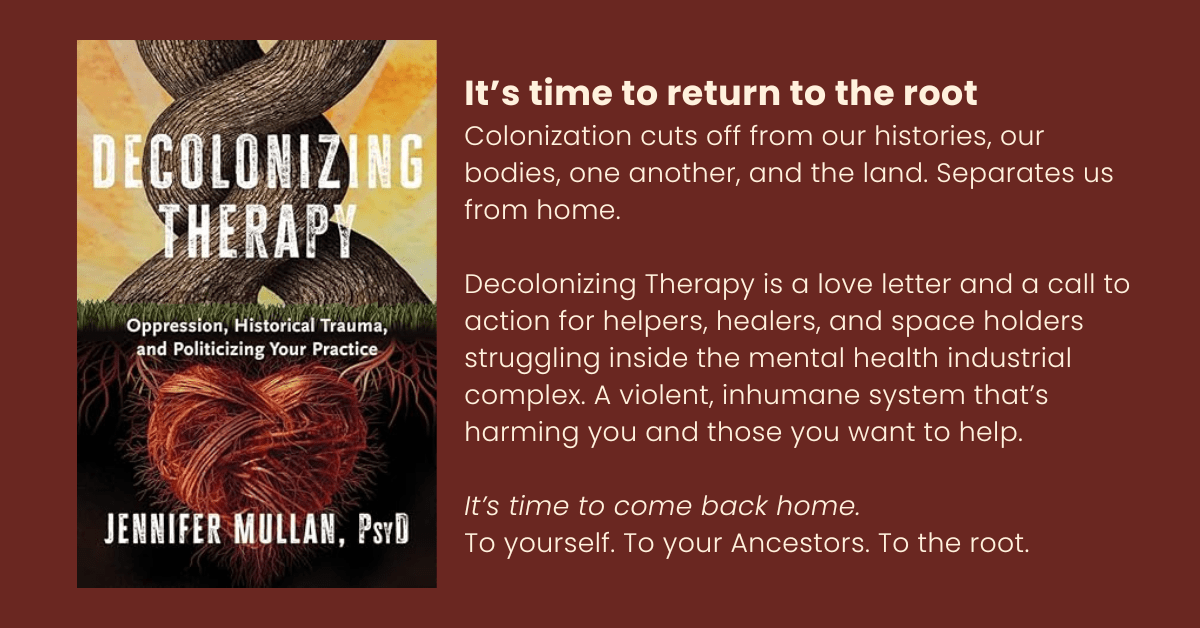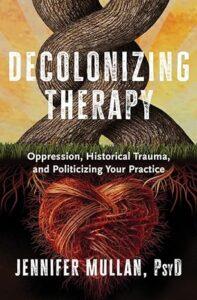Editor’s Note: In this series, we invite individuals and practitioners from various fields to share their perspectives on how Diversity, Equity, Inclusion, and Justice has supported them and their work. This post is excerpted from Dr. Jennifer Mullan’s book released this week: Decolonizing Therapy: Oppression, Historical Trauma, and Politicizing Your Practice.
It is crucial that we are clear that therapy as it stands is not a substitute for systemic and structural change. I am clear that the mental, educational, and behavioral health systems will need restructuring in order to maintain wellness, accountability, and fluency, as the collective world begins to create new ways. But first, this politicization, this revolution, this decolonization must be within.
Following are some ways therapists perpetuate white supremacy:
- Maintaining power dynamics between therapist and client by positioning therapist as expert.
- Framing systemic oppressions and experiences of oppression as politics, belief systems, and perceptions.
- Overemphasizing individual choice and self-responsibility.
- Avoiding topics of race and how it plays into the traumatic experience.
- Dismissing appropriate emotional responses to oppression such as rage.
- Positioning racial trauma as past events, not an ongoing experience that will continue to happen.
- Equating cultural competency and values for diversity as a safety for BIPOC.
- Maintaining neutrality in discussions of oppression and avoiding taking a stance. By being mindful of unresolved grief and distrust of majority groups or government programs, human service providers can more readily deliver programs to reduce family stress, child abuse and neglect, substance misuse, mental health challenges, and domestic violence.
Countless scholars, elders, community organizers, clinicians, peer counselors, ancestors, and clients have pondered, throughout the years, that rather than diagnosing and pathologizing a person and grouping their symptoms into a disorder to “track and treat,” what would it be like to consistently and collectively create a holistic approach? A whole approach that looks at the entire person, their spirituality, their ancestral history, their health, as opposed to deifying the Diagnostic and Statistical Manual of Mental Disorders (DSM), which was mostly created by older, male, white-identifying psychologists and psychiatrists who impregnated the DSM with their white supremacist biases.
Many, many holistic, ancestrally guided, and decolonial approaches have been passed down, created, and are currently being utilized, from the departed brilliant Jamaican psychiatrist, Dr. Frederick W. Hickling’s work as executive director of the Caribbean Institute of Mental Health and Substance Abuse (CARIMENSA), University of the West Indies (his contributions of Jamaican psychiatry to decolonizing global mental health have been tremendous), to the power and cultural bridges of Dr. Michael Yellow Bird’s Neurodecolonization and Indigenous Mindfulness. Dr. Yellow Bird is an Indigenous scholar, activist, and citizen of the Arikara (Sahnish), Hidatsa, and Mandan tribes in North Dakota.
We must also acknowledge the necessary brilliance of Black trans medical exercise specialist, physical therapist assistant, and educator Ilya Parker, founder of Decolonizing Fitness. As our bodies, all bodies, must also find a place to “land,” to find health and safety as we shift our paradigms while creating space for trans and nonbinary people. There is also the vital consulting work of Ta7talíya Nahanee, Squamish CEO and consultant of Decolonize First, who engages social change through interactive workshops and workbooks for youth, and Sonalee Rashatwar, a self-identified nonbinary fat futurist, therapist, social worker, and cofounder of Radical Therapy Center in Philadelphia. Sonalee reminds us that colluding with fatphobia is unethical and a continuation of colonization.
Decolonization is not about getting stuck within the mud of our historical traumas. Decolonizing includes reclamation. Decolonizing includes land sovereignty. Decolonizing includes liberation from mental, physical, emotional, and financial slavery. Decolonization includes us, here, now, and preparing for the pivot and shift of the near future, everywhere from education, to criminal justice, to health care, to housing, to mental and behavioral health.
Excerpted from Decolonizing Therapy: Oppression, Historical Trauma, and Politicizing Your Practice © 2023 by Jennifer Mullan. Used with permission of the publisher, W. W. Norton & Company.






![A Point of View: Beyoncé, “Formation”, and Being Your [Unapologetic] Authentic Self](https://theinclusionsolution.me/wp-content/uploads/2016/02/beyonce-formation-car-braids.jpg)













